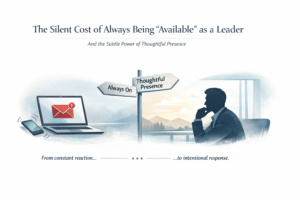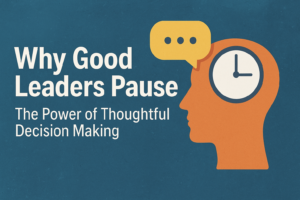I first heard about Artificial Intelligence and Machine Learning when I went to college in the USA almost 35 years ago. Back then, AI was offered as a course you could take, but it mostly remained a research subject that was fascinating yet far from real-world impact. For several years it remained something we discussed more than we experienced.
AI has come a long way now. Today it writes emails, summarizes research, generates reports, pictures, and even generates legal documents. Tools like ChatGPT, Perplexity, and Gemini have made our world faster, more efficient and perhaps made us a bit lazier too. But let’s be honest: for all its brilliance, AI still has a long way to go before it can replace leadership.
Because leadership isn’t just about predicting what’s next, it’s about sensing what’s now. It’s about connecting with people, feeling the pulse of a situation, and making judgment calls in moments no model has ever seen before. Leadership still demands something deeply, unmistakably human, and those capacities are more vital today than ever.
Empathy: The Competitive Advantage AI Can’t Replicate
AI can analyse sentiment, measure tone, and detect keywords. But can it empathize? The answer is a clear no.
AI doesn’t feel the anxiety when a team is close to burning out. It won’t notice the trembling voice in a meeting or pause to ask if it’s just a cold or something deeper. It won’t sense when a big win doesn’t feel like one, because everyone’s running on empty after months of hard work.
That’s where real leadership begins.
A survey by Wiley (2024) found that 80% of workers believe soft skills are more important than ever in the age of AI. Among them, communication and leadership ranked highest. A research published in August 2025 by HBR reinforced this, showing that foundational skills like collaboration, adaptability, and problem-solving are no longer “nice to have” but they’re central to success.
Empathy builds trust, and trust builds commitment. When a team knows their leader truly understands them, they give more, stay longer, and grow stronger. That’s something no algorithm can replicate.
Beyond Efficiency: Leadership and Moral Judgment
AI can optimize for efficiency, reduce costs, and even suggest solutions but what about outcomes that affect human lives? In areas like healthcare, social programs, or supporting the vulnerable, leaders must balance profit, purpose, and principle and no algorithm can do that alone.
“The Best Leaders Can’t Be Replaced by AI” (HBR, 2024), found that employees have less confidence in AI than in human bosses when it comes to decisions requiring moral judgment. So, when it comes to ethics, who do we trust more?
Ethical leadership consistently ranks among the skills AI cannot replicate. As Forbes notes, true leadership requires recognizing subtle nuances, fairness, bias, privacy all of which go far beyond algorithmic outputs. Leadership is not just about making the “right” decision, it’s about making the human decision.
Seeing What AI Can’t: The Human Gift of Vision
AI is exceptional at spotting patterns, especially in large datasets. But true vision? That’s about seeing what isn’t there yet, imagining possibilities, asking “what if,” and taking risks where no data exists. That’s the territory of human leaders.
Research from NBER, 2025 found that leadership performance with AI agents strongly correlates with performance with human teams. However, the high-performing leaders were those who asked more questions, used plural pronouns (we/us), and those who engaged in conversational turn-taking, not just executing tasks.
In “AI-First Leadership: Embracing the Future of Work” (Harvard Business), only 48% of mid-level leaders felt their creativity and ingenuity were being utilised in transformation efforts. So many organizations seem to be treating AI as mechanistic toolboxes. They are missing out on the visionary contributions of human leaders.
Ambiguity and Leadership: The Human Factor
Human beings are complex, and their work can be messy. Not everything fits a neat data model. Emotional states, cultural nuances, socio-political changes, conflicts of values, failures, and fear, all of these require human judgment. AI simply cannot read a room the way a human leader can.
In “The Best Leaders Can’t Be Replaced by AI,” 57% of employees said they don’t trust AI to understand human behaviour in work more accurately than a human leader and only about 21% believed AI could outperform humans in this dimension.
Also, many people prefer face-to-face or human interaction when dealing with difficult conversations: according to the same Wiley survey, 84% would rather handle a tough subject in person than via an AI or templated interaction.
Leadership beyond Rules: Building Connection and Culture
Leadership is relational. It’s about shaping a culture through shared stories, values, rituals, and a sense of belonging. Culture isn’t what you write in a document, it’s what people feel. It shows up when someone joins late, when someone fails, or when someone stumbles. These are moments AI cannot enforce or replicate.
Human leaders’ model behaviour, set norms, and celebrate small wins, actions that are difficult to codify but essential in practice.
Endurance, Sacrifice, Trust: The Human Edge
AI works in cycles of data updates, model retraining, and code revisions. Human leaders operate differently; they carry stories, reputation, and moral weight. They show up consistently over years, through crises, successes, and the daily grind alike.
People trust human leaders not just when they win, but also when things go wrong, because commitment and personal sacrifice cannot be automated.
Lead with AI, not as AI
AI is transformative. It can speed up decisions, bring insights, and free leaders from routine tasks. And yes, AI has shown glimpses of empathy. I’ve personally shared moods and feelings with AI, and the responses were surprisingly thoughtful. There may be a time in the future where AI and robots may approach human-level understanding, however that future is not here yet.
Leadership remains deeply human. It is empathy, ethics, vision, culture, trust, and the courage to lead without a map. Great leaders ask the right questions, sense what people feel, and focus not just on what is possible, but on what is meaningful.
For those who fear AI will replace human leaders: the roles that truly matter, the ones that inspire, connect, and transform, are beyond its reach, and will remain so for the foreseeable future.



